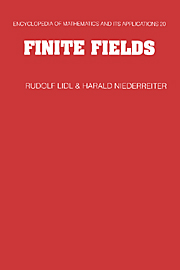Book contents
- Frontmatter
- Contents
- Foreword
- Preface
- Chapter 1 Algebraic Foundations
- Chapter 2 Structure of Finite Fields
- Chapter 3 Polynomials over Finite Fields
- Chapter 4 Factorization of Polynomials
- Chapter 5 Exponential Sums
- Chapter 6 Equations over Finite Fields
- Chapter 7 Permutation Polynomials
- Chapter 8 Linear Recurring Sequences
- Chapter 9 Applications of Finite Fields
- Chapter 10 Tables
- Bibliography
- List of Symbols
- Author Index
- Subject Index
Foreword
Published online by Cambridge University Press: 02 November 2009
- Frontmatter
- Contents
- Foreword
- Preface
- Chapter 1 Algebraic Foundations
- Chapter 2 Structure of Finite Fields
- Chapter 3 Polynomials over Finite Fields
- Chapter 4 Factorization of Polynomials
- Chapter 5 Exponential Sums
- Chapter 6 Equations over Finite Fields
- Chapter 7 Permutation Polynomials
- Chapter 8 Linear Recurring Sequences
- Chapter 9 Applications of Finite Fields
- Chapter 10 Tables
- Bibliography
- List of Symbols
- Author Index
- Subject Index
Summary
Most modern algebra texts devote a few pages (but no more) to finite fields. So at first it may come as a surprise to see an entire book on the subject, and even more for it to appear in the Encyclopedia of Mathematics and Its Applications. But the reader of this book will find that the authors performed the very timely task of drawing together the different threads of development that have emanated from the subject. Foremost among these developments is the rapid growth of coding theory which already has been treated in R. J. McEliece's volume in this series. The present volume deals with coding theory in the wider context of polynomial theory over finite fields, and also establishes the connection with linear recurring series and shift registers.
On the pure side there is a good deal of number theory that is most naturally expressed in terms of finite fields. Much of this—for example, equations over finite fields and exponential sums—can serve as a paradigm for the more general case; and the authors have gone as far in their treatment as is reasonable, using elementary algebraic methods only. As a result the book can also serve as an introduction to these topics.
But finite fields also have properties that are not shared with other types of algebra; thus they (like finite Boolean algebras) are functionally complete. This means that every mapping of a finite field can be expressed as a polynomial.
Information
- Type
- Chapter
- Information
- Finite Fields , pp. xi - xiiPublisher: Cambridge University PressPrint publication year: 1996
Accessibility standard: Unknown
Why this information is here
This section outlines the accessibility features of this content - including support for screen readers, full keyboard navigation and high-contrast display options. This may not be relevant for you.Accessibility Information
- 2
- Cited by
